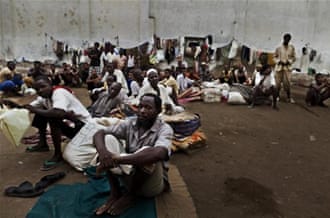By Ali Al-Bassam
Impunity Watch Reporter, Middle East
SANAA, Yemen — Human Rights Watch (HRW) released a 30 page report last Monday, revealing the number of juveniles who currently face capital punishment in Yemen. For their report, HRW interviewed five young men and a young woman on death row in Sanaa Central Prison, and also reviewed case files for nineteen other alleged juvenile offenders.

Titled “‘Look at Us with a Merciful Eye’: Juvenile Offenders Awaiting Execution on Yemen’s Death Row,” HRW urged President Abdu Rabu Mansour Hadi to immediately reverse execution orders for three alleged juvenile offenders who had exhausted their appeals process and currently await an execution by firing squad.
The report also revealed that at least 22 juveniles were sentenced to death despite being under 18 years old at the time they allegedly committed the crime. It also stated that at least fifteen men and women who claimed to be below the age of eighteen were executed in the last five years.
Human Rights campaigners criticize Yemen, who has one of the highest death penalty rates in the world, for increasingly jailing and executing people who committed crimes as children. Campaigners also criticized Yemen for its failure to provide everyone with birth certificates, and for having a failing justice system.
Mariam al-Batah, a nineteen year old who is currently awaiting execution, was one of the prisoners mentioned in HRW’s report. For three years, she has called Hodeida Central Prison, a crowded jail located in Yemen’s Western Coast, home. She was sentenced to death for committing murder at the age of fifteen. Her family came from a rural background, like 80% of Yemen’s estimated population, and failed to register a birth certificate for her, resulting in tragic consequences. Al-Batah, who was married off at the age of twelve, killed the child of her husband’s first wife when the child released her from a room that her husband had locked her in. She recalled rushing out of the room in a “disoriented and dizzy state,” and then violently hurled the child to the floor, killing it immediately. When she could not produce a birth certificate before the court to prove she was younger than eighteen, she was sentenced to death.
Since 1994, Yemen’s penal code had banned the execution of juveniles. Under Yemeni law, children fifteen years and younger can be tried as adults, but are only subject to a maximum penalty of ten years imprisonment if found guilty of murder. “Proving one’s age is a huge issue in Yemen in these cases,” said Priyana Motaparthy, a researcher for HRW. “But there is a second issue: even in cases when juvenile offenders and lawyers were able to produce strong evidence suggesting they were under eighteen for their alleged crime, judges and prosecutors have disregarded Yemeni law and called for death sentences.”
HRW said that President Hadi should review all death sentences where doubt exists that the defendant was at least eighteen years of age at the time the offense was committed, and to commute sentences when evidence of a defendant’s age is inconclusive or in conflict.
HRW says that Yemen is one of four countries in the Middle East where juveniles can still be face capital punishment. The other three are Iran, Saudi Arabia, and Sudan.
Al Jazeera — Yemen Unyielding on Child Executions — 4 March 2013
Human Rights Group — Yemen: Juvenile Offenders Face Execution — 4 March 2013
United Press International — HRW: Yemeni Government Urged to Stop Executing Youthful Offenders — 4 March, 2013
Yemen Post — HRW Urges new Government in Yemen to Stop Executions of Juveniles — 4 March 2013